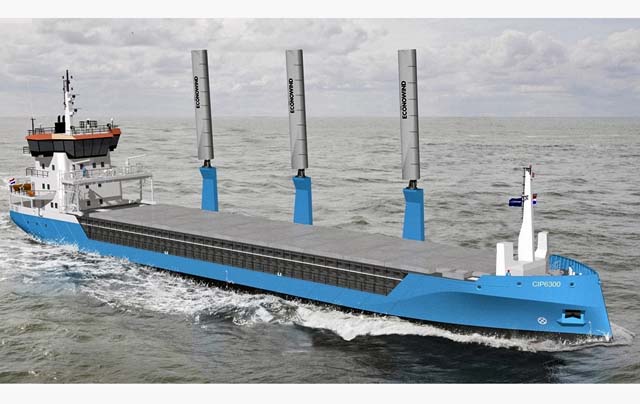Dutch company Conoship International has shown off its latest creation, known as the CIP6300 General Cargo Vessel, which it describes as a symbol of environmental responsibility and adaptability.
At the heart of the design philosophy is a commitment to fuel efficiency and sustainability. Equipped with a diesel-electric propulsion system, the 99.9m long 6375 dwt CIP6300 boasts a large propeller diameter, a key element in ensuring optimal propulsion efficiency. The vessel’s optimised hull lines further contribute to its fuel economy, said to be a crucial factor in today’s eco-conscious shipping industry.
It is designed from the outset for compatibility with wind-assisted propulsion, strengthening the commitment to reducing carbon emissions and minimising the vessel’s ecological footprint.
Following in the footsteps of Conoship International’s CIP3600 and CIP3800, the CIP6300 is an example of an environmentally friendly cargo vessel designed with the future in mind. With a single, spacious cargo hold boasting high cubic capacity, this vessel can handle a diverse range of cargo, whether heavy or light.
Conoship considers the most groundbreaking aspect to be its adaptability in fuel selection. The design allows for the possibility of changing the type of fuel in the future without the need for a radical and costly conversion. This feature is especially important as the industry transitions towards cleaner, alternative fuels. The CIP6300 ensures that vessel owners can stay ahead of environmental regulations without major disruptions to operations. For example, the generators could be replaced with a methanol power generator set with methanol tanks, or completely substituting liquid hydrogen tanks and fuel cells. All these redesign possibilities were taken into account from the beginning of the conceptual design process.
Conoship’s approach is believed to offer customers the opportunity to build vessels in a shipyard of their choice. A switch of fuel type to future fuels is facilitated through the requirements of such future fuels being considered from the beginning of the conceptual design process.
The fuel consumption of the vessels in the CIP-series is expected to be best in class, with the design ready for wind-assisted propulsion, further reducing fuel consumption and CO₂ emissions by about 10%, depending on the sailing route. By standardising certain ship types, product innovations can be introduced more easily and with less risk, offering financial benefits as the design package is more affordable. Standardisation of the design can cut delivery times by up to one year.
The vessel is powered by four gensets and two electric motors, ensuring smooth and efficient propulsion. A 350kW bow thruster enhances manoeuvrability. The cargo hold measures 66.66m in length, 13.15m in breadth, and 10.6m in height.



